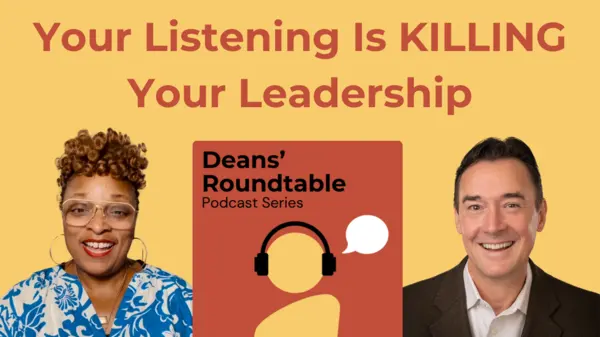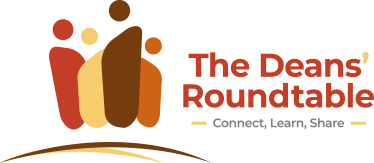Effective Listening Skills for Leaders: Andrew McMasters on Communication
I recently had the pleasure of welcoming Seattle-based entrepreneur, corporate trainer, and professional actor Andrew McMasters to the Dean’s Roundtable podcast. We discussed his new book, “Listening Without Agenda,” and explored how effective listening transforms leadership.

The Challenge of Truly Listening
How often do we listen with our full attention? As a former Dean of Students, I know firsthand how easy it is to listen with an agenda – planning responses or making assumptions about what someone will say before they finish speaking.
Andrew pointed out that this approach prevents meaningful communication. “We all enter conversations thinking, ‘Oh, I’ve heard the first few words, so I know what’s going to happen,'” he explained. This habit limits our ability to understand others and build authentic connections.
Fascinating Brain Science Behind Our Listening Habits
One of the most interesting parts of our conversation was when Andrew shared the brain science that explains why attentive listening is so challenging. He referenced Ian McIlchrist’s work on how different parts of our brain process information:
“On the right side, our medial prefrontal cortex is aware, watching, listening… that’s where information’s coming in. And then on the other side of our prefrontal cortex is where we are categorizing against things we already know.”
The problem occurs when we stop being aware and jump to categorizing information based on assumptions. This prevents us from hearing what’s actually being said – something I saw happen countless times in student meetings.
A Simple Exercise That Changes Everything
Andrew shared a powerful exercise from his book that I’m eager to try:
- Have someone tell a story for about two minutes
- Listen without nodding, smiling, or saying “uh-huh” or “right”
- Shut down your internal monologue
- Notice how this affects your ability to truly hear what’s being shared
When Andrew described this exercise, I immediately thought about how much I rely on my internal monologue when listening to students. I often mentally prepare my response while they’re still speaking. This exercise could help identify those automatic responses that interfere with genuine listening.
Following this with reflective listening – “This is what I heard, is that correct?” – creates clarity that benefits everyone in the conversation.
You Can Accept Without Agreeing
One distinction Andrew made that really resonated with me was between accepting and agreeing. In improvisation, the principle of “Yes, And” doesn’t mean always agreeing – it means accepting someone’s reality before building on it.
“There is a way to accept what someone has said because that’s their reality and then build on it,” Andrew explained. This approach allows for productive conversations even when viewpoints differ.
He used the COVID pandemic as an example: “None of us wanted to be in a pandemic, but we were. So what do you do? You accept it and then figure out what we need to do now.”
This reminds me of difficult conversations I’ve had with students who were seeing situations very differently than I was. Taking a moment to accept their perspective first – without necessarily agreeing with it – would have created more space for finding solutions together.
Bringing Humor Into Leadership
Coming from an improvisation background, Andrew naturally brought up how humor can enhance learning and engagement. “Everything that you ever read about any kind of learning is that there is a percentage of fun that goes into that learning,” he noted.
I asked Andrew specifically about how school and nonprofit leaders can use humor without undermining their authority. While not every situation calls for laughter in the moment (and some student issues I dealt with as Dean certainly weren’t funny), debriefing difficult situations with humor can help process experiences and identify lessons learned.
Taking These Skills Into Educational Settings
With his family background in education (his father was a principal and his mother taught pre-first grade), Andrew sees direct applications for these listening skills in educational settings.
He emphasized that schools face unique challenges with each new generation of students. The solution? “We have to be looking at each individual generation or each individual student specifically as an individual and listening for what they need.”
As someone who’s worked in education for years, this resonated deeply with me. Our tendency to apply last year’s solutions to this year’s students often creates disconnect.
Just Do It: Practice Makes Permanent
My favorite takeaway from our conversation was Andrew’s simple but powerful call to action: practice these skills rather than just thinking about them. “Don’t just listen to me, do it,” he urged.
Building effective listening habits requires practice in low-stakes situations so we’re prepared when important conversations arise. As I always tell educators, “Practice makes permanent.” If we don’t exercise these listening muscles regularly, they won’t be available when we need them most.
And yes, this means we’ll make mistakes along the way – which Andrew sees as essential for growth. “We have to let go of that fear of failure sometimes so that we can actually take actions and move forward,” he concluded.
I couldn’t agree more. For school leaders who worry about making mistakes, remember that not making a choice is still making a choice – and often not the most productive one.
Bridget Johnson
Discover the new Deans’ Roundtable Student Life Assessment Tool
(Accepting Founding Schools for a limited time only)
Want more support as a student life professional?
Look no further than the Deans' Roundtable Community
- Network with a vast directory of student life professionals like yourself
- Gain a multitude of professional development opportunities to be the best version of yourself
- Gather expert advice on the important questions you need answered

